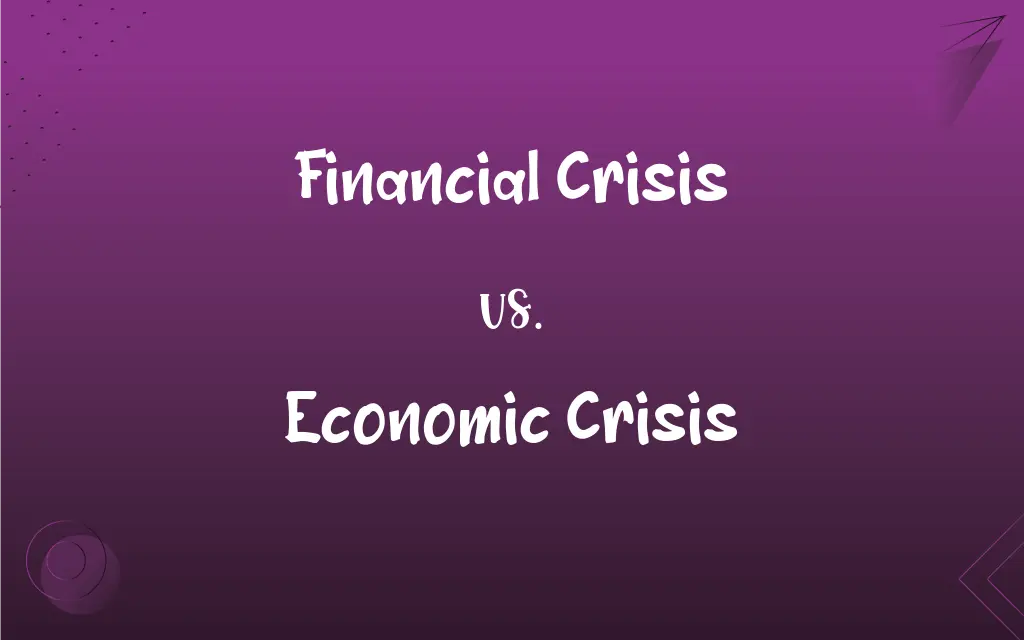Financial Crisis vs. Economic Crisis: What's the Difference?
Edited by Aimie Carlson || By Harlon Moss || Published on November 12, 2023
A financial crisis pertains to disruptions in financial markets; an economic crisis involves broader economic decline.

Key Differences
A financial crisis and an economic crisis, while interrelated, are distinct phenomena in the spheres of finance and economics. A financial crisis specifically refers to severe disruptions in the functioning of financial markets, often resulting from sudden drops in asset values or failures of important financial institutions. For instance, the 2008 crisis began in the housing market and rapidly affected global financial systems. On the other hand, an economic crisis is broader, indicating a sharp decline or stagnation in the economic activity of a region or country, affecting production, employment, and consumption levels.
The root causes of a financial crisis typically emerge from excessive risk-taking, lack of transparency, or regulatory shortcomings within the financial sector. Events like bank runs, collapses of major institutions, or significant declines in stock markets highlight a financial crisis. An economic crisis, conversely, stems from more varied sources, ranging from political instability, wars, or even natural disasters to financial disruptions. When an economic crisis occurs, one might observe rising unemployment, falling incomes, or decreasing GDP.
It's worth noting that while a financial crisis can trigger an economic crisis, the reverse isn't always true. A financial meltdown, as seen in the collapse of Lehman Brothers in 2008, can lead to reduced lending, decreased consumer confidence, and, subsequently, a full-blown economic downturn. However, an economic crisis, like one resulting from geopolitical tensions, might not necessarily precipitate a financial crisis.
Remedies for both types of crises differ. Addressing a financial crisis might involve bailouts, monetary policy adjustments, or regulatory reforms targeting the stability of financial institutions and markets. Counteracting an economic crisis could require broader interventions, such as fiscal stimulus, structural reforms, or international aid, aimed at rejuvenating economic growth and stability.
Comparison Chart
Scope
Relates to financial markets
Encompasses entire economy
ADVERTISEMENT
Causes
Excessive risk-taking, regulatory failures
Varied: political issues, financial disruptions, etc.
Examples
Bank failures, stock market crashes
Rising unemployment, falling GDP
Potential Triggers
Asset bubbles, banking panics
Natural disasters, wars, financial crises
Interventions
Bailouts, monetary policy adjustments
Fiscal stimulus, structural reforms
Financial Crisis and Economic Crisis Definitions
Financial Crisis
A severe disruption in financial markets.
The collapse of a major bank led to a global financial crisis.
ADVERTISEMENT
Economic Crisis
Can arise from various external or internal factors.
Political instability in the region sparked an economic crisis.
Financial Crisis
Can stem from lack of transparency in financial sectors.
Opaque lending practices were a major factor in the 2008 financial crisis.
Economic Crisis
Impacts production, consumption, and employment.
The country faced an economic crisis with factories shutting down.
Financial Crisis
Often involves bank runs or institutional failures.
Panic among depositors created a bank run, exacerbating the financial crisis.
Economic Crisis
A broad decline in economic activity.
High unemployment rates signaled a deep economic crisis.
Financial Crisis
Resulting from declines in asset values.
The housing bubble's burst initiated a significant financial crisis.
Economic Crisis
Requires comprehensive solutions for recovery.
The government launched a fiscal stimulus package to tackle the economic crisis.
Financial Crisis
May necessitate regulatory or monetary interventions.
Central banks stepped in to mitigate the impacts of the financial crisis.
Economic Crisis
Might be marked by stagnation or recession.
Continuous quarters of negative growth confirmed the economic crisis.
FAQs
What are typical interventions for a financial crisis?
Typical interventions include monetary policy adjustments, bailouts, or regulatory reforms.
Which crisis is broader in scope?
An economic crisis is broader, affecting various sectors of an economy, while a financial crisis is more specific to financial markets.
Can a financial crisis lead to an economic crisis?
Yes, disruptions in financial markets, like a financial crisis, can cascade into broader economic downturns.
How does a bank run relate to a financial crisis?
A bank run, where depositors rush to withdraw funds, can either trigger or exacerbate a financial crisis due to liquidity issues.
Are stock market crashes indicative of a financial crisis?
While stock market crashes are a sign, they don't always lead to a broader financial crisis, but they can if systemic issues are present.
Which crisis is harder to predict?
Both are challenging to forecast, but financial crises might be slightly more unpredictable due to the volatility of financial markets.
Are housing bubbles related to financial or economic crises?
Housing bubbles primarily relate to financial crises when they burst, but their aftermath can lead to broader economic downturns.
How do central banks typically respond to a financial crisis?
Central banks might lower interest rates, offer emergency funding, or implement regulatory changes in response to a financial crisis.
What primarily defines a financial crisis?
A financial crisis is defined by severe disruptions in financial markets, often due to sudden asset value drops or major institutional failures.
How does consumer confidence relate to these crises?
Declining consumer confidence can aggravate both financial and economic crises, as it dampens spending and investment.
Which crisis might require international aid?
An economic crisis, especially in developing countries, might necessitate international aid for recovery.
What role do global institutions like the IMF play in these crises?
Institutions like the IMF can provide financial assistance, policy advice, and technical expertise during crises.
How does inflation factor into these crises?
Hyperinflation can trigger an economic crisis, while deflationary spirals can follow financial crises.
How is an economic crisis different from a recession?
While both indicate economic downturns, a recession is a specific form of economic crisis characterized by two consecutive quarters of negative GDP growth.
Can an economic crisis occur without a financial crisis?
Yes, an economic crisis can be triggered by factors like political events or natural disasters without a preceding financial crisis.
Do geopolitical tensions cause a financial or economic crisis?
Geopolitical tensions usually lead to an economic crisis, but they can indirectly spark a financial crisis if financial markets are severely affected.
How does unemployment relate to these crises?
Rising unemployment is typically a symptom of an economic crisis but can also result from a prolonged financial crisis.
Can governments prevent these crises?
While full prevention is challenging, governments can mitigate risks by enforcing robust regulations and maintaining economic stability.
How long does recovery from an economic crisis typically take?
Recovery durations vary, depending on the crisis's severity and the effectiveness of intervention measures.
Can one country's financial crisis trigger a global economic crisis?
Yes, in an interconnected global economy, a major country's financial crisis can ripple into a global economic downturn.
About Author
Written by
Harlon MossHarlon is a seasoned quality moderator and accomplished content writer for Difference Wiki. An alumnus of the prestigious University of California, he earned his degree in Computer Science. Leveraging his academic background, Harlon brings a meticulous and informed perspective to his work, ensuring content accuracy and excellence.
Edited by
Aimie CarlsonAimie Carlson, holding a master's degree in English literature, is a fervent English language enthusiast. She lends her writing talents to Difference Wiki, a prominent website that specializes in comparisons, offering readers insightful analyses that both captivate and inform.







































































